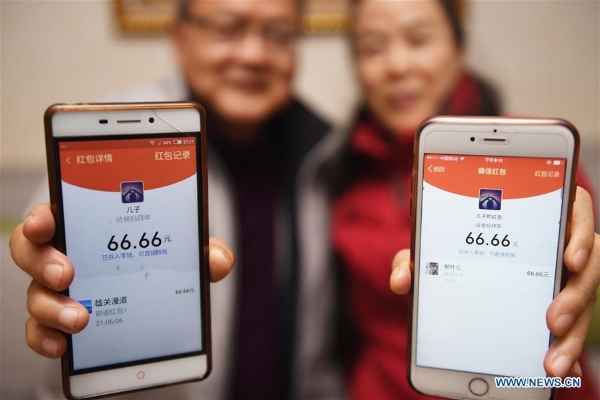China's inter-bank payment system passes severe test
 0 Comment(s)
0 Comment(s) Print
Print E-mail Xinhua, February 6, 2019
E-mail Xinhua, February 6, 2019
China's inter-bank payment and settlement system passed a tough test on Lunar New Year's eve as the Chinese zealously snatched lucky money in virtual red envelopes for good fortune.

China UnionPay, a leading payment network, processed inter-bank payment and settlement deals worth 261.7 billion yuan (about US$39 billion) Monday night, the Lunar New Year's eve, up 81.3 percent from the same day of last year, Shanghai Securities News reported Tuesday on its APP.
The average response time for each deal processed by China UnionPay's network was only 220 milliseconds, and no deals failed.
Citing sources with China UnionPay, the newspaper said the country's inter-bank payment system had been "well tested in a reality check."
As authorized by the People's Bank of China, China UnionPay handled only a portion of the country's inter-bank payment and settlement needs during the Spring Festival, which mainly involves the Wechat red packets launched by Tencent and Baidu red packets.
Giving cash in red envelopes (hongbao) is a traditional practice during the Spring Festival and it has been shifting online thanks to the promotion of mobile payment in which people use apps to send, snatch and draw virtual hongbaos on their smartphones.
The digital red envelope race during the Chinese New Year holiday has become a new tradition since Tencent made a splash in 2014 with the hongbao service on its popular instant messaging app WeChat, drawing millions of new users for its mobile payment service.
The race has been particularly fierce this year, as more tech giants lavished lucky money to attract mobile users.
Chinese artificial intelligence giant Baidu, for instance, took the lead this year by preparing a record high of 1.9 billion yuan (US&281.7 million) for digital red envelopes after becoming the exclusive red envelope partner of the China Central Television (CCTV) Spring Festival Gala, the most-watched annual show on Chinese New Year eve.
Alibaba continued its game of collecting five blessings to share the lucky money of 500 million yuan, while Weibo prompted users to retweet certain posts to share 100 million yuan. Many firms put 2,019 yuan into red envelopes as the biggest prize.
Tencent also rolled out a specific hongbao service for firms to give red envelopes to their employees in its latest efforts to boost services for corporate customers.
Douyin, a leading Chinese short-video platform, jumped onto the wagon by partnering with the CCTV gala and launching a red envelope game worth 500 million yuan in total, in an effort to encourage users to send short-video new year greetings to expand on its already 500-million-plus monthly active users.
Compared to the everyday needs for inter-bank payment and settlement, the Spring Festival holiday is much more demanding as a larger amount of deals under more diverse trading scenarios need to be processed concurrently, according to sources with China UnionPay.
Apart from red packet deals, online and offline payment concerning dining, transportation, shopping in department stores, currency conversion, cross-border withdrawals and remittance, centralized receiving and payment and other kinds of deals saw a substantial growth during the holiday.
To cope with the demand, China UnionPay said it had established one-for-one real-time communication and response mechanism with key commercial banks and payment institutions and monitored the transaction processing under all sorts of trading scenarios.






Go to Forum >>0 Comment(s)